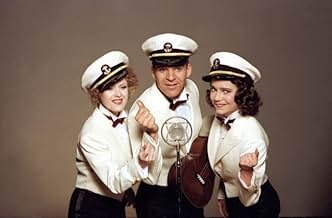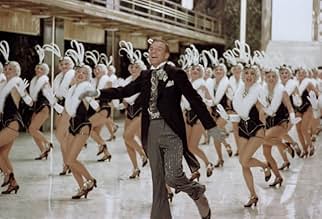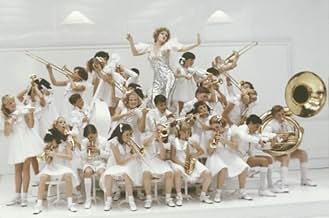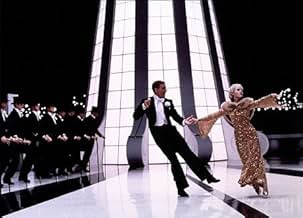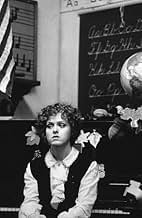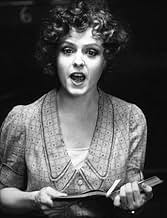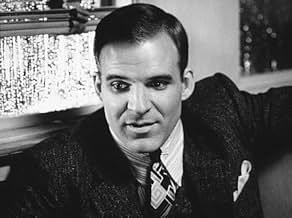NOTE IMDb
6,5/10
6,6 k
MA NOTE
Ajouter une intrigue dans votre langueDuring the Great Depression, a sheet-music salesman seeks to escape his dreary life through popular music and a love affair with an innocent schoolteacher.During the Great Depression, a sheet-music salesman seeks to escape his dreary life through popular music and a love affair with an innocent schoolteacher.During the Great Depression, a sheet-music salesman seeks to escape his dreary life through popular music and a love affair with an innocent schoolteacher.
- Réalisation
- Scénario
- Casting principal
- Nommé pour 3 Oscars
- 3 victoires et 9 nominations au total
Francis X. McCarthy
- The Bartender
- (as Frank McCarthy)
Shirley Kirkes Mar
- Tart
- (as Shirley Kirkes)
Avis à la une
the more I am amazed. It is the film that Chicago could have been were it not for its irony. I never saw the BBC original, but fondly remember Potter's "The Singing Detective." I can understand that Hoskin's Cockney optimism would fit Pennies' lead character to a tee, but Martin gives us a hint of the fragility of the song pusher's world, like Willy Loman, out there on a shoeshine, and for Martin, a song.
The film is innovative and definitely not your father's musical, and the songs, done up not in 1981 over-orchestration but in that tinny sound of early vinyl, just blow me away. After I saw it, I went searching for Follow the Fleet just to see 'Face the Music' in reel time.
This film will not be everyone's cup of tea. It is one of those movies that I say works best when you begin with "Once upon a time."
The film is innovative and definitely not your father's musical, and the songs, done up not in 1981 over-orchestration but in that tinny sound of early vinyl, just blow me away. After I saw it, I went searching for Follow the Fleet just to see 'Face the Music' in reel time.
This film will not be everyone's cup of tea. It is one of those movies that I say works best when you begin with "Once upon a time."
Man, did I love the musical numbers in this film.....but hated the story. I wound up taping just the music segments out of this film and making myself a neat little half-hour video of fantastic song-and-dance numbers.
The dance numbers are 1920s-1930s material except you get 1980s color and special-effects (and loose sexual mores). Actually, these are more like put- ons of those routines, including Busby Berkeley extravaganzas. Added to the routines are humor. I just laughed out loud at the absurdity of them, which included having the actors lip-sync to the old-time singers.
The dance routines are all totally different and very entertaining, from the opening bank skit, to the kids in the classroom to Christopher Walken's striptease to Steve Martin and Bernadette Peters imitating Astaire & Rogers. The dancing is good and the songs are great: catchy and fun.
Story-wise, Martin ("Arthur Parker") plays a boorish, profane, lying and just plain unlikeable character. Are we supposed to root for him? Maybe we are to root for Peters, who plays "Lulu," the school teacher-turned- prostitute (sounds like real-life these days with all the female teacher sex scandals). Hey, I like Martin in a lot of films. He can be a very entertaining guy, but the character he plays in here.....well, you can have him and this very cynical and depressing story. No thanks.
It's no surprise to me it bombed at the box office. Too bad, because with a more appealing story a lot more people would have been treated to the great musical numbers in this movie.
The dance numbers are 1920s-1930s material except you get 1980s color and special-effects (and loose sexual mores). Actually, these are more like put- ons of those routines, including Busby Berkeley extravaganzas. Added to the routines are humor. I just laughed out loud at the absurdity of them, which included having the actors lip-sync to the old-time singers.
The dance routines are all totally different and very entertaining, from the opening bank skit, to the kids in the classroom to Christopher Walken's striptease to Steve Martin and Bernadette Peters imitating Astaire & Rogers. The dancing is good and the songs are great: catchy and fun.
Story-wise, Martin ("Arthur Parker") plays a boorish, profane, lying and just plain unlikeable character. Are we supposed to root for him? Maybe we are to root for Peters, who plays "Lulu," the school teacher-turned- prostitute (sounds like real-life these days with all the female teacher sex scandals). Hey, I like Martin in a lot of films. He can be a very entertaining guy, but the character he plays in here.....well, you can have him and this very cynical and depressing story. No thanks.
It's no surprise to me it bombed at the box office. Too bad, because with a more appealing story a lot more people would have been treated to the great musical numbers in this movie.
This film has so many good things in it and so much talent worked so very hard on it that it's just baffling to me that so much of it doesn't work. I love '30s and '40s musicals, and I saw this film in 1981, and I've seen it about 10 times more on DVD. I like a lot of it, but somehow it's just not a very good movie, and I still can't figure out why.
The music is good. The musical numbers are creatively shot and well-executed; the Walken number alone took weeks to film. The sets, costumes, photography, and color are beautiful and give the film a real Depression feel. Clearly, no expense was spared. The actors give it their all. The re-creations of photos and paintings (including "Nighthawks" which is actually from WW2) are breathtaking. They must have been very hard to set up, light, and shoot. But, in keeping with the film's low-key style, they're not lingered on at all, and if you look away you can miss them.
Is the problem Steve Martin? This choice caused some controversy in 1981. He lacked film experience and he might not have been the ideal choice, although it's hard to guess what other leading man could have done that vaudeville stuff in 1981. Martin, at least, doesn't obviously fall down on the job; the verdict is still out. But Peters, who even apart from this film seems to belong to the '30s, holds up her end of things.
Maybe it's the script and the way the film is conceived. If the idea is to realize what these '30s drudges fantasize about-- and to do it in a '30s-musical style, as if they imagine themselves the heroes of musicals-- then there has to be something to the drudges that makes us care what they fantasize about. But there isn't enough to these people. They're drawn as thin types; yet the material is played very slowly, as if they were supposed to turn into real people at some point. They never do, and so by the end it all peters out (no pun intended). I also thought the subplot with the young girl was a maudlin absurdity, right out of a Mary Pickford tear-jerker.
Perhaps the real problem can be traced back to the origins of the project. It plays almost like an English musical made in an American style, and it doesn't work very well. The humor in the book is too tedious, too black, and too obsessed with tit jokes to be American. And the musical numbers are too slick, loud, and overproduced to be English. The filmmakers couldn't find a way to make these two parts fit together. And so they are just jammed together over and over again. One is constantly aware of the bad fit. It just doesn't come together, but in the various parts there are still more than enough reasons to see it.
The music is good. The musical numbers are creatively shot and well-executed; the Walken number alone took weeks to film. The sets, costumes, photography, and color are beautiful and give the film a real Depression feel. Clearly, no expense was spared. The actors give it their all. The re-creations of photos and paintings (including "Nighthawks" which is actually from WW2) are breathtaking. They must have been very hard to set up, light, and shoot. But, in keeping with the film's low-key style, they're not lingered on at all, and if you look away you can miss them.
Is the problem Steve Martin? This choice caused some controversy in 1981. He lacked film experience and he might not have been the ideal choice, although it's hard to guess what other leading man could have done that vaudeville stuff in 1981. Martin, at least, doesn't obviously fall down on the job; the verdict is still out. But Peters, who even apart from this film seems to belong to the '30s, holds up her end of things.
Maybe it's the script and the way the film is conceived. If the idea is to realize what these '30s drudges fantasize about-- and to do it in a '30s-musical style, as if they imagine themselves the heroes of musicals-- then there has to be something to the drudges that makes us care what they fantasize about. But there isn't enough to these people. They're drawn as thin types; yet the material is played very slowly, as if they were supposed to turn into real people at some point. They never do, and so by the end it all peters out (no pun intended). I also thought the subplot with the young girl was a maudlin absurdity, right out of a Mary Pickford tear-jerker.
Perhaps the real problem can be traced back to the origins of the project. It plays almost like an English musical made in an American style, and it doesn't work very well. The humor in the book is too tedious, too black, and too obsessed with tit jokes to be American. And the musical numbers are too slick, loud, and overproduced to be English. The filmmakers couldn't find a way to make these two parts fit together. And so they are just jammed together over and over again. One is constantly aware of the bad fit. It just doesn't come together, but in the various parts there are still more than enough reasons to see it.
When Herb Ross opened "Pennies From Heaven" during Christmas of 1981 it met with harsh press and public indifference. Many concluded the musical was dead.
But "Pennies," like Bob Fosse's "All That Jazz" released two years before, is a key transitional work that juxtaposed the cynicism of the '70s to the exhilaration and escapist fantasy of its buoyant Depression era score.
Steve Martin ran the risk of alienating his fan base by trading in the "Wild and Crazy" guy for the brooding, unfaithful Arthur Parker. But he's a revelation. And what a dancer!
It was no surprise when audiences stayed away.
By all means watch it today, particularly on the new widescreen DVD release. You'll walk away with a greater appreciation of Christopher Walken, Bernadette Peters and especially Steve Martin.
It makes it so much harder to watch this major talent wasting himself in such tripe as "Cheaper by the Dozen" and "Bringing Down the House."
But "Pennies," like Bob Fosse's "All That Jazz" released two years before, is a key transitional work that juxtaposed the cynicism of the '70s to the exhilaration and escapist fantasy of its buoyant Depression era score.
Steve Martin ran the risk of alienating his fan base by trading in the "Wild and Crazy" guy for the brooding, unfaithful Arthur Parker. But he's a revelation. And what a dancer!
It was no surprise when audiences stayed away.
By all means watch it today, particularly on the new widescreen DVD release. You'll walk away with a greater appreciation of Christopher Walken, Bernadette Peters and especially Steve Martin.
It makes it so much harder to watch this major talent wasting himself in such tripe as "Cheaper by the Dozen" and "Bringing Down the House."
Heavy-going, off-putting Depression-era musical (set to old recordings of the 1930s) is quite elaborate and usually looks good, but is filled with ciphers. Steve Martin, in a fair dramatic acting turn, plays a sex-obsessed sheet-music salesman in Chicago with no conscience who cheats on his frigid wife with a schoolteacher, later becoming involved in a murder investigation. Unfortunately for Martin, this character is such a crude, lascivious lout, we don't really care about his fate or whether or not his teacher-girlfriend (now a prostitute) leaves him. Jessica Harper (as the cold-fish wife) is every married man's nightmare: the bride-turned-shrew; Bernadette Peters is somewhat more sympathetic as the lover, and gets to utilize her natural Kewpie doll-ness to fantastic effect in the musical numbers. But, for the most part, "Pennies From Heaven" is peopled with low-lifes. The extravagant showstoppers, fantasy sequences designed like mini Busby Berkeley movies, are breathlessly intricate and exciting to watch, but they provide little emotional subtext for what's happening in the real world (I don't know if original creator Dennis Potter meant it or not, but the material plays like "Up the Sandbox" with music). Herbert Ross directed with a heavy hand, though he does get some fine moments from his cast, especially Christopher Walken as a hoofing pimp. An expensive remake of a British mini-series starring Bob Hoskins, the movie ultimately feels a bit claustrophobic and sluggish, and has an unsatisfying wrap-up to its reedy-thin plot. **1/2 from ****
Le saviez-vous
- AnecdotesChristopher Walken's bar-top dance scene took two months of rehearsal and two days of shooting. He claims he got compliments later from fans Fred Astaire and Gene Kelly.
- GaffesIn the classroom, a modern Canadian flag can be seen. It wasn't designed until 1964.
- Citations
Joan Parker: [referring to Arthur's male organ, after discovering he's having an affair] Cut his thing off.
[the detective shows a look of shock and disgust]
Joan Parker: I want them to cut his thing off and bury it!
- Bandes originalesPennies from Heaven
(1936)
Written by Johnny Burke and Arthur Johnston
Published by Intersong Music
Performed by Arthur Tracy
Courtesy of Decca Co. Ltd
Later sung by Steve Martin (uncredited)
Meilleurs choix
Connectez-vous pour évaluer et suivre la liste de favoris afin de recevoir des recommandations personnalisées
- How long is Pennies from Heaven?Alimenté par Alexa
Détails
- Date de sortie
- Pays d’origine
- Langue
- Aussi connu sous le nom de
- Pennies from Heaven
- Lieux de tournage
- 4th Street Bridge, Los Angeles, Californie, États-Unis(murder scene, S Santa Fe Ave. Overpass)
- Sociétés de production
- Voir plus de crédits d'entreprise sur IMDbPro
Box-office
- Budget
- 22 000 000 $US (estimé)
- Montant brut aux États-Unis et au Canada
- 9 171 289 $US
- Montant brut mondial
- 9 171 289 $US
- Durée
- 1h 48min(108 min)
- Mixage
- Rapport de forme
- 1.85 : 1
Contribuer à cette page
Suggérer une modification ou ajouter du contenu manquant



